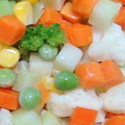Frozen or Fresh – fruits and vegetables?
 Fruits and vegetables are all part of the Food Pyramid and the plate model, but is it better to eat fresh instead of frozen fruits and vegetables? If you look at the nutritional properties, there is little difference. In some cases there are even more nutrients in frozen than in fresh foods. Often, fresh and frozen vegetables contain almost the same amount of vitamin A, vitamin C, protein and fiber.
Fruits and vegetables are all part of the Food Pyramid and the plate model, but is it better to eat fresh instead of frozen fruits and vegetables? If you look at the nutritional properties, there is little difference. In some cases there are even more nutrients in frozen than in fresh foods. Often, fresh and frozen vegetables contain almost the same amount of vitamin A, vitamin C, protein and fiber.
If you want to preserve as much nutrients as possible, you should rather pay attention to the way you store and cook your fruits and vegetables. It is mainly the water soluble vitamins, vitamin B and C, that are reduced due to a long-term storage and for cooking at high heat.
How you store and cook is more important
Fruits and vegetables are sensitive to light, so try and keep your fruits and vegetables away from direct sunlight. The longer you store fruits and vegetables, the more vitamins are lost. Also, most fruits and vegetables are sensitive to heat and shouldn’t be cooked for too long. Steaming is one of the best ways of preserving nutrients as well as flavor, texture and color. Steam or cook your fruits and vegetables “al dente”, tender outside and crisp inside.
Most nutrients directly after the harvest
You should eat your fruits and vegetables as soon as possible after the harvest, if you want most of the nutrients. Fresh fruits and vegetables must often be transported from the field to the wholesaler and then to the store shelf, a process that normally takes around three days in cold storage and / or room temperature. In the meantime, the fruits and vegetables may lose some of its nutrient. Many fruits and vegetables are harvested before fully mature, which may also affect negatively on the nutritional values.
Advantages with frozen fruits and vegetables
Frozen vegetables are harvested when they are fully mature and are then frozen within 2-3 hours. Important nutrients are preserved quite quickly after the harvest, which is crucial since vitamins and flavors are affected from the moment that they are harvested.
Another advantage with frozen fruits and vegetables is that you can keep them in your freezer for a long time. In that way you don’t need to go to the supermarket every other day. One study showed that after three days in the store and three days in the fridge – a typical situation after purchase – the fresh green bean only kept 36% of its original vitamin C content. Frozen green beans kept, 77% of its original vitamin C – more than twice as much!
Eat both fresh and frozen fruits and vegetables
In order to get enough of the important nutrients that you need every day, you should eat both fresh and frozen fruits and vegetables. This way it’s more likely that you will eat 2-4 servings of fruits and 3-5 serving of vegetables every day, which is the amount recommended by the previous dietary guidelines from the U.S. Department of Agriculture.
-
Advertisement

 Facebook
Facebook  Twitter
Twitter  RSS
RSS







